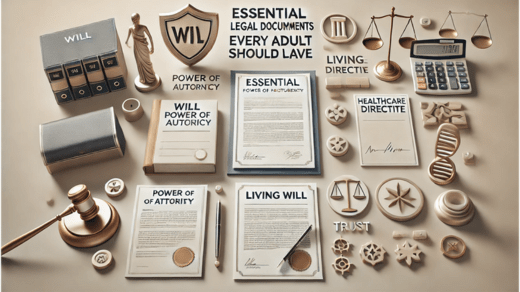In today’s complex world, having the right legal documents in place is crucial for ensuring that your wishes are honored and your affairs are managed according to your preferences. As an adult, there are several essential legal documents that everyone should consider having. These documents not only provide peace of mind but also help avoid potential legal complications. This article explores the key legal documents every adult should have and why they are important.
1. Will
A will is a fundamental legal document that outlines how your assets should be distributed after your death. It allows you to designate beneficiaries for your property, appoint guardians for your minor children, and name an executor to manage your estate. Without a will, state laws will determine how your assets are divided, which may not align with your wishes.
Why You Need a Will
- Control Over Assets: A will ensures that your assets are distributed according to your wishes.
- Guardian Appointment: It allows you to choose a guardian for your minor children.
- Reduce Family Disputes: Clear instructions can help prevent disputes among family members.
2. Living Will
A living will, also known as an advance directive, specifies your medical treatment preferences in the event that you become incapacitated and unable to communicate your wishes. This document provides guidance on whether you want life-sustaining treatments or whether you prefer comfort care only.
Why You Need a Living Will
- Ensure Your Wishes Are Honored: A living will make sure that your healthcare providers follow your preferences.
- Reduce Burden on Family: It alleviates the emotional burden on family members who might otherwise have to make difficult decisions.
3. Durable Power of Attorney
A durable power of attorney grants another person the authority to make financial decisions on your behalf if you become incapacitated. This document is crucial for managing your finances, paying bills, and handling other financial matters when you cannot do so yourself.
Why You Need a Durable Power of Attorney
- Financial Management: It ensures that your financial matters are handled according to your wishes.
- Avoid Legal Complications: Without this document, your family may need to go through a lengthy court process to obtain guardianship.
4. Healthcare Power of Attorney
Similar to a durable power of attorney, a healthcare power of attorney designates someone to make medical decisions on your behalf if you are unable to do so. This document ensures that someone you trust will make healthcare choices aligned with your preferences.
Why You Need a Healthcare Power of Attorney
- Medical Decision-Making: It appoints someone to make important healthcare decisions if you are incapacitated.
- Align with Your Values: Ensures that decisions reflect your personal values and wishes.
5. Financial Power of Attorney
A financial power of attorney differs from a durable power of attorney in that it specifically deals with financial matters. It allows you to name an individual to handle your financial affairs, such as managing investments, paying bills, and handling real estate transactions.
Why You Need a Financial Power of Attorney
- Comprehensive Financial Management: It covers all aspects of your financial life, from banking to investments.
- Preparedness for Incapacity: Ensures that your financial affairs are managed smoothly in case of incapacity.
6. Trust
A trust is a legal arrangement where one party (the trustee) holds and manages assets for the benefit of another party (the beneficiary). Trusts can be used for various purposes, including estate planning, asset protection, and tax planning. They come in many forms, such as revocable trusts, irrevocable trusts, and special needs trusts.
Why You Need a Trust
- Avoid Probate: Assets in a trust generally do not go through probate, making the process quicker and less costly.
- Privacy: Trusts can provide privacy, as they do not become public records like wills.
- Asset Protection: Trusts can protect assets from creditors and legal judgments.
7. Beneficiary Designations
Beneficiary designations are crucial for assets like life insurance policies, retirement accounts, and other financial accounts. These designations determine who will receive the asset upon your death, bypassing the probate process.
Why You Need Beneficiary Designations
- Direct Transfer of Assets: Ensures that assets pass directly to your chosen beneficiaries.
- Avoid Probate: Helps avoid the lengthy and costly probate process for certain assets.
8. Letter of Intent
A letter of intent is a non-legal document that provides additional instructions or guidance to your loved ones and executor. It can include details about your funeral arrangements, personal messages, and any specific wishes not covered in your will or other legal documents.
Why You Need a Letter of Intent
- Personal Touch: Offers a chance to communicate personal wishes and preferences.
- Guidance for Executors: Provides additional context and instructions for your executor.
9. Property Deeds
Property deeds are legal documents that prove ownership of real estate. If you own property, it’s important to have updated and properly recorded deeds. This ensures that ownership is clear and can be easily transferred to heirs or beneficiaries.
Why You Need Property Deeds
- Clear Ownership: Ensures that property ownership is legally documented and recognized.
- Ease of Transfer: Facilitates the transfer of property to beneficiaries or heirs.
10. Marriage and Divorce Documents
Marriage and divorce documents are essential for managing your personal and financial affairs. They include marriage certificates, divorce decrees, and prenuptial agreements. These documents can impact your estate planning and financial arrangements.
Why You Need Marriage and Divorce Documents
- Proof of Marital Status: Important for legal and financial matters.
- Clarify Asset Distribution: Helps in updating your estate plan and financial documents after marriage or divorce.
Conclusion
Having the essential legal documents in place is a critical part of responsible adulthood. These documents ensure that your wishes are honored, your assets are managed according to your preferences, and your loved ones are taken care of. From wills and trusts to powers of attorney and beneficiary designations, each document plays a unique role in protecting your interests and providing peace of mind.
Regularly reviewing and updating these documents is also important, especially after major life events such as marriage, divorce, or the birth of a child. Consulting with a legal professional can help ensure that all your documents are in order and meet your specific needs. By taking these steps, you can safeguard your future and ensure that your affairs are handled according to your wishes.



